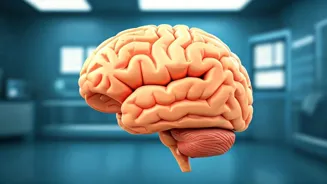A Silent Struggle
Alzheimer's disease presents a significant global health concern, often unfolding silently over time. It is a progressive neurological disorder, characterized
by the gradual loss of brain cells, leading to cognitive decline, memory loss, and behavioral changes. This insidious nature makes early detection extremely challenging. Initial symptoms, like forgetting recent events or having difficulty with familiar tasks, may be subtle and easily dismissed as simple forgetfulness associated with aging. The disease's progression varies among individuals, with symptoms worsening over years. Early intervention is vital because it can enable people to start the available treatments that help in symptom management and improve the quality of life. However, in the past, late diagnosis meant that interventions were often less effective.
New Drugs' Emergence
The arrival of new drugs represents a pivotal moment in Alzheimer's treatment. These innovative treatments, often targeting the underlying causes of the disease, mark a shift from merely managing symptoms to potentially altering the disease course. These new medications aim to reduce the buildup of amyloid plaques in the brain, a hallmark of Alzheimer's disease. Clinical trials have provided encouraging results, suggesting that these drugs could slow cognitive decline. While these drugs are not a cure, they hold the potential to provide patients with more time to function independently and participate in activities that bring them joy. The development of these new drugs has also provided a stimulus to continue research in the field, leading to further advancements and improved treatment options.
Early Detection Advantage
Early diagnosis of Alzheimer's is increasingly recognized as a critical step in disease management. Advances in diagnostic techniques are now enabling the detection of the disease in its earlier stages. These methods include advanced brain imaging, such as PET scans and MRIs, which can detect the presence of amyloid plaques and other biomarkers associated with Alzheimer's. Spinal fluid analysis, which analyzes the fluid around the spinal cord, can also help in identifying Alzheimer's-specific proteins. Early diagnosis allows for the timely initiation of treatments and lifestyle changes that can help to preserve cognitive function and improve quality of life. It also opens the door to participation in clinical trials, potentially providing access to cutting-edge treatments and contributing to the advancement of Alzheimer's research. The earlier the diagnosis, the better the chances of slowing the progression of the disease.
Shifting Treatment Paradigm
The combination of new drugs and early diagnosis represents a significant change in the approach to Alzheimer's treatment. This change moves from a focus on managing symptoms to intervening at an earlier stage, potentially slowing the progression of the disease. Early detection and the use of new drugs together have the potential to improve the quality of life for people living with Alzheimer's. Furthermore, this approach can provide more time for patients and their families to prepare for the challenges ahead, empowering them to make informed decisions about their care and future. This comprehensive approach reflects a shift towards proactive and personalized medicine. Ultimately, this combined approach offers hope for better outcomes, making the management of Alzheimer's more effective and more compassionate for those affected.





















